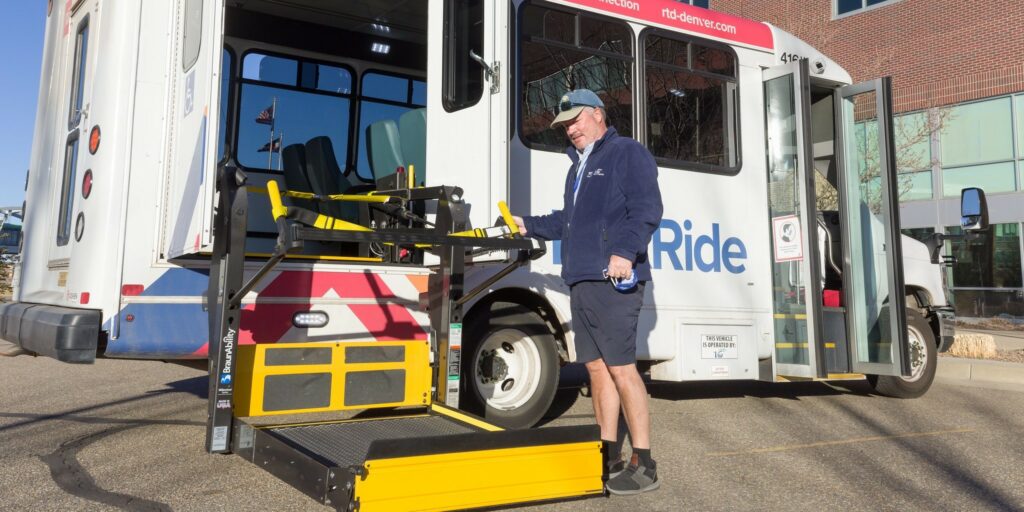GDT > RTD Rider’s Guide > Paratransit > Access-a-Ride

Access-a-Ride, is a fully Americans with Disabilities Act (ADA) compliant door-to-door van service that can take riders in wheelchairs and other mobility devices.
Who can use Access-a-Ride?
To travel on Access‑a‑Ride, individuals must meet one of the following criteria set forth by the Americans with Disabilities Act of 1990 (Section 37.123 (3)):
- Be unable to get to and from a bus stop or on and off a lift-equipped fixed-route bus by themselves.
- Have a disability that prohibits them from completing fixed-route bus independently.
In addition to this, the individual must live in the RTD District and within 3/4 mile of a fixed route bus (commuter routes excepted) or rail stop. Individuals who meet the eligibility criteria are issued with an RTD Access-a-Ride ID card which must available for inspection on every trip.
How does the service work?
Trips on Access-a-Ride need to be scheduled between one and seven days in advance. Riders can either download and use the QRyde app to schedule a trip or call a dedicated Access-a-Ride number on 303-299-2960. Riders are given a 30 minute window which they need make themselves available for pick up.
The service is provided by mobility contractors for RTD who operate cutaway buses which are 100% ADA accessible. Every day, individual routes are devised in response to the trips scheduled for each vehicle to follow. Extra time is built in to allow drivers to assist riders in boarding and de-boarding plus detting to and from their front door. The drivers participate in a comprehensive training program designed specifically for transporting individuals with disabilities.
What does it cost?
| Fare Type | Full Fare | LiVE Discount | Fixed Route * |
| One-way | $4.50 | $2.25 | $1.35 |
| Airport One-way | $19.00 | $9.50 | $1.35 |
| 6-Ride Ticket Book | $27.00 | $13.50 | $8.10 ** |
| Monthly Pass | – | – | $27.00 |
* Fixed route fares quoted for comparison are at the discounted rate, which is available to individuals with disabilities.
** Amount quoted is 6 x $1.35.
Curiously, Access-a-Ride offers a two tier fare system, despite all riders being eligible for the same discounted fares on fixed-route service. Also, the 6-ride ticket books are somewhat pointless as they offer no discount off one-way tickets bought individually.
For individuals with disabilities who are not low-income, the one-way fare is 333% of the discounted fix-route fare. This represents an equity issue and disabled advocates are pushing for fares to capped at 150% of their fixed-route equivalents.
What are the problems?
- It should be obvious by now that the Access-a-Ride is a pretty inflexible service to use, when compared to Access-on-Demand or even regular fixed-route bus and rail service. Spur of the moment trips are not an option as everything has to be reserved at least one day in advance. Also, as the service only has a certain amount of vehicles on the road each day and therefore a limit on capacity, it is possible that riders can be told there are no vehicles available when they use the app or call to schedule a ride.
- Riders are pretty much at the mercy of how a particular driver is making progress with their route, including delays caused by other riders. While the QRyde app can provide some tracking information, the 30min pick up window means most Access-a-Ride riders spend a sizable chunk of their trip time waiting.
- As a shared van service, it is not guaranteed that riders will be driven directly to their destinations meaning arrival times are hard to predict. Travelers over a certain age will remember using Supershuttle as a low-cost way to get to and from the airport and then cursing their decision as the the clock ticked away because the driver had to make multiple detours to pick up other riders. For Access-a-Ride users, that is still their reality!
- Access-a-Ride users can lose their eligibility if RTD withdraws the bus service from their local bus stop or if they are forced to move within the district to a new address that is more than 1/4 mile from a fixed-route due to housing issues. Disability advocates are pushing for eligibility to be “grandfathered” meaning it is kept if an individual’s circumstances change through no fault of their own.